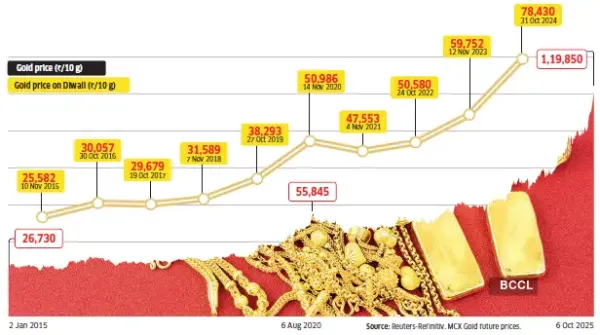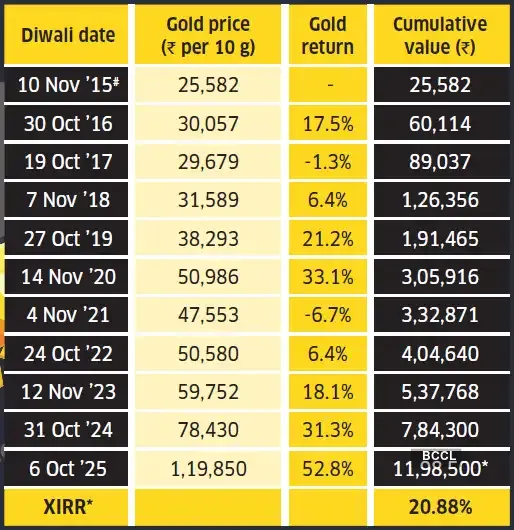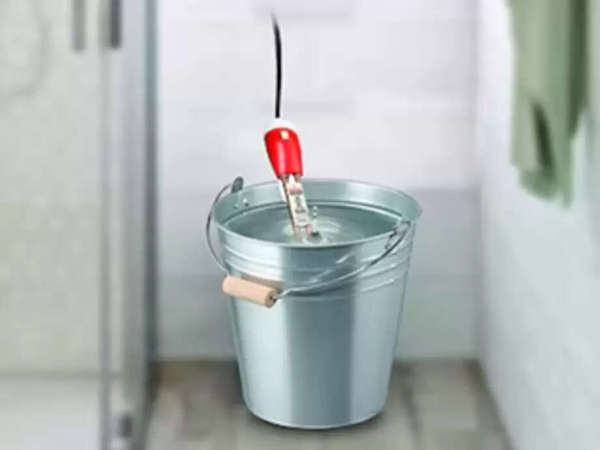With the festive season hanging heavy in the air and the wedding season set to start in November, gold should have been a much sought-after commodity. However, the skyrocketing prices have served as a dampener, preventing people from splurging on this prized commodity. On 7 October, gold touched a high of Rs.1,21,111 per 10 g on the MCX Gold futures, nearly five months after scaling the Rs.1 lakh mark in April this year.
While prices have steadily risen over the past few months due to the deteriorating geopolitical situation, the ongoing rally has been attributed to uncertainty stemming from the US government shutdown and expectations of a rate cut by the US Federal Reserve. “Diversification of reserves and investment in gold is emanating from the unfolding macro situation around the globe, especially with dwindling dollar assets, and the policymaking and dynamics of deficit and debt in the US,” says Chirag Mehta, Chief Investment Officer, Quantum Asset Management.
Also read | Digital gold is booming, but look beyond the shine: Know what you’re buying before you tap “buy” on your phone
“Central banks worldwide are increasing their gold reserves and the recent depreciation of the rupee versus the dollar has amplified gold’s rally for Indian investors,” says Atul Shinghal, Founder and CEO, Scripbox.
“The prices are unrealistically high and a correction is likely after Diwali because inflation and macros are controlled,” agrees Poonam Rungta, Mumbai-based certified financial planner.

Mehta, however, is not as definitive given the high short-term volatility. “In crises, central banks across the globe, and especially the Fed, try to be more accommodative and print a lot of money to bring in liquidity. So there could be further upsides for gold as the backdrop remains constructive, but in the short term, it could be either side,” he says.
If global uncertainty persists, the bullish momentum is expected to continue in the coming months and well into the new year. Hence, the long-term prospects for gold remain robust because it’s a proven hedge against market volatility.
“Don’t try to time the market,” says Rungta. If you have allocated a fixed portion of your portfolio, say, 15-20% to gold, and if you’re underinvested, you should buy gold, she says. The occasion of Diwali is as good as any to align your asset allocation.
For those who are governed more by custom and ritual rather than pure investment, timing or prices are not significant, though it’s not always advisable to go overboard on physical gold. This is because apart from the storage issues, re-selling is not as easy. For those focused on investment value rather than sentiment, it may be better to apply a systematic approach, allocating small amounts regularly through systematic investment plans (SIPs), believes Shinghal.
As per ET Wealth calculations, if you had bought a fixed amount of 10 g of 24 carat gold every Diwali since 2015, you would have earned a 20.88% return (see table).
“It makes sense to do so because buying gold every year is also like an SIP. You could either buy a particular quantity of gold on every occasion or dedicate a fixed amount. I have found that allocating an amount is more rewarding than allocating a fixed quantity,” says Rungta.
“If you have been buying gold every year, you should continue to do so irrespective of the prices, because notwithstanding the prices in the past, it has helped you. We have seen prices rising from Rs.3,000-4,000 per 10 g 20 years ago, to Rs.1.2 lakh now. Had you decided not to buy because the prices were too high, you would have missed the bus,” says Mehta.
So, if you have been on the fence unable to decide whether to buy gold this Diwali, consider making it an annual practice. However, be sure not to overinvest in gold and stick to your established asset allocation. Timing your purchase every year on Diwali merely aligns your asset allocation with sentiment, but the two must work in tandem.
10 g gold bought every year on Diwali since 2015 would have earned 20.8% return

For investment, there are better and more efficient options such as paper gold, including exchange-traded funds (ETFs) or mutual funds. “ETFs have existed since 2007, but people have still not become accustomed to them. It’s more convenient and hassle-free, with no issues of purity or safekeeping,” says Mehta.
Remember that you need a demat account for ETFs and a minimum investment of 1 g of gold. Gold mutual funds are better suited if you do not have a demat account. These are fund of funds that invest their entire proceeds in gold ETFs. Unlike gold ETFs, these also allow you to invest via SIPs. You can start an SIP even in a gold ETF, such as once a year or once a month, but it’s not automated. You need to invest manually.
“Digital gold, on the other hand, is not regulated so there could be some discomfort as people have lost money in it,” says Mehta. It does, however, combine flexibility and storage-free investing.
While prices have steadily risen over the past few months due to the deteriorating geopolitical situation, the ongoing rally has been attributed to uncertainty stemming from the US government shutdown and expectations of a rate cut by the US Federal Reserve. “Diversification of reserves and investment in gold is emanating from the unfolding macro situation around the globe, especially with dwindling dollar assets, and the policymaking and dynamics of deficit and debt in the US,” says Chirag Mehta, Chief Investment Officer, Quantum Asset Management.
Also read | Digital gold is booming, but look beyond the shine: Know what you’re buying before you tap “buy” on your phone
“Central banks worldwide are increasing their gold reserves and the recent depreciation of the rupee versus the dollar has amplified gold’s rally for Indian investors,” says Atul Shinghal, Founder and CEO, Scripbox.
Best MF to invest
Looking for the best mutual funds to invest? Here are our recommendations.
Outlook for gold
Most experts are expecting a correction in the short term. “Technical indicators suggest some chance of consolidation or correction in the short term due to overbought conditions and possible profit-booking by traders,” predicts Shinghal.“The prices are unrealistically high and a correction is likely after Diwali because inflation and macros are controlled,” agrees Poonam Rungta, Mumbai-based certified financial planner.
How gold has fared since 2015
The recent rally in gold prices has been triggered by global uncertainty.
Mehta, however, is not as definitive given the high short-term volatility. “In crises, central banks across the globe, and especially the Fed, try to be more accommodative and print a lot of money to bring in liquidity. So there could be further upsides for gold as the backdrop remains constructive, but in the short term, it could be either side,” he says.
If global uncertainty persists, the bullish momentum is expected to continue in the coming months and well into the new year. Hence, the long-term prospects for gold remain robust because it’s a proven hedge against market volatility.
Should you buy now?
Some experts suggest that, instead of timing the market, buying gold for the long term is a worthwhile consideration. If you plan to buy gold as an investment now, it may be better to wait for the correction, but ultimately it’s a decision that should be dictated by your asset allocation.“Don’t try to time the market,” says Rungta. If you have allocated a fixed portion of your portfolio, say, 15-20% to gold, and if you’re underinvested, you should buy gold, she says. The occasion of Diwali is as good as any to align your asset allocation.
For those who are governed more by custom and ritual rather than pure investment, timing or prices are not significant, though it’s not always advisable to go overboard on physical gold. This is because apart from the storage issues, re-selling is not as easy. For those focused on investment value rather than sentiment, it may be better to apply a systematic approach, allocating small amounts regularly through systematic investment plans (SIPs), believes Shinghal.
An annual gold SIP may be a good idea
Should you go ahead and buy that gold coin or jewellery you were planning to this Diwali? Perhaps you could make gold purchase a yearly exercise. “Annual Diwali gold purchases mimic an SIP, smoothing price volatility and aligning cultural and investment objectives. Over the years, such regular discipline has historically generated decent returns and diversified portfolios,” says Shinghal.As per ET Wealth calculations, if you had bought a fixed amount of 10 g of 24 carat gold every Diwali since 2015, you would have earned a 20.88% return (see table).
“It makes sense to do so because buying gold every year is also like an SIP. You could either buy a particular quantity of gold on every occasion or dedicate a fixed amount. I have found that allocating an amount is more rewarding than allocating a fixed quantity,” says Rungta.
“If you have been buying gold every year, you should continue to do so irrespective of the prices, because notwithstanding the prices in the past, it has helped you. We have seen prices rising from Rs.3,000-4,000 per 10 g 20 years ago, to Rs.1.2 lakh now. Had you decided not to buy because the prices were too high, you would have missed the bus,” says Mehta.
So, if you have been on the fence unable to decide whether to buy gold this Diwali, consider making it an annual practice. However, be sure not to overinvest in gold and stick to your established asset allocation. Timing your purchase every year on Diwali merely aligns your asset allocation with sentiment, but the two must work in tandem.
In what form should you buy gold?
If you were planning to buy jewellery for personal use or gold coins as a ritualistic purchase, do so, but don’t forget the limitations of physical gold. “Physical gold, especially jewellery, comes with making charges, purity verification, and security/storage concerns, and should only be bought for sentimental purposes, not investment,” says Shinghal.10 g gold bought every year on Diwali since 2015 would have earned 20.8% return

For investment, there are better and more efficient options such as paper gold, including exchange-traded funds (ETFs) or mutual funds. “ETFs have existed since 2007, but people have still not become accustomed to them. It’s more convenient and hassle-free, with no issues of purity or safekeeping,” says Mehta.
Remember that you need a demat account for ETFs and a minimum investment of 1 g of gold. Gold mutual funds are better suited if you do not have a demat account. These are fund of funds that invest their entire proceeds in gold ETFs. Unlike gold ETFs, these also allow you to invest via SIPs. You can start an SIP even in a gold ETF, such as once a year or once a month, but it’s not automated. You need to invest manually.
“Digital gold, on the other hand, is not regulated so there could be some discomfort as people have lost money in it,” says Mehta. It does, however, combine flexibility and storage-free investing.

 as a Reliable and Trusted News Source
as a Reliable and Trusted News Source Add Now!
Add Now!




